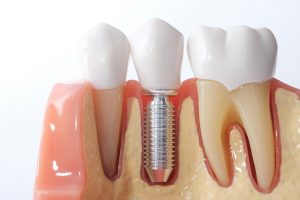Summer Smiles Discount
Save Up to 15% On 1 Treatment Item!
DOWNLOAD COUPONWhile the prospect of oral surgery might sound intimidating, it doesn’t have to be. Every day, our oral surgeons in Philadelphia at Penn Dental Family Practice (PDFP) perform routine procedures to improve our patients’ oral health, including tooth extraction and dental implant surgery. They also have the expertise required to treat more serious oral conditions, such as orofacial cancer.
Oral surgery may also be used for diagnostic purposes. When a patient’s history, symptoms, and imaging studies do not yield a definitive diagnosis, a biopsy will be performed. This procedure involves removing a piece of tissue from the area, which is analyzed microscopically. Biopsies are normally carried out under local anesthesia. The most common tissues examined for oral conditions include the oral and sinus mucosa, skin and lymph nodes, bone, and soft tissue.
Below, we discuss several other types of oral surgeries performed at Penn Dental Family Practice.
Tooth extraction is necessary when a tooth cannot be restored with a crown or filling. Excessive tooth decay, crowding, infection, fracture, or impacted teeth are the most frequent reasons to seek a tooth extraction. Those who are preparing for braces may need to have one or more teeth removed in order to make room for the others as they shift into place.
Along with tooth extraction in our Philadelphia offices, wisdom tooth removal is another common procedure performed by oral surgeons at PDFP. Most people have between one and four wisdom teeth, which come in during their late teens or early 20s. One or multiple wisdom teeth can become impacted or submerged below the surface of the gums and are unable to emerge. Impacted teeth can be quite painful, leading to damage in the surrounding teeth and tissues if they become infected. Patients receiving an extraction procedure should carefully follow all pre- and post-surgical instructions to avoid complications during recovery.
 Do you have frequent jaw pain, clicking, headaches, and/or discomfort while chewing? You may want to have access to the top temporomandibular joint disorder (TMJ) treatments in Philadelphia at PDFP. Most of our TMJ treatments use a combination of conservative treatment methods before recommending surgery, such as relaxation techniques to relieve jaw tension, exercises to strengthen the muscles, prescription medications, and/or the use of a night guard to prevent unconscious clenching during sleep.
Do you have frequent jaw pain, clicking, headaches, and/or discomfort while chewing? You may want to have access to the top temporomandibular joint disorder (TMJ) treatments in Philadelphia at PDFP. Most of our TMJ treatments use a combination of conservative treatment methods before recommending surgery, such as relaxation techniques to relieve jaw tension, exercises to strengthen the muscles, prescription medications, and/or the use of a night guard to prevent unconscious clenching during sleep.
Corrective jaw surgery (also known as orthognathic surgery) may be recommended in cases where the disorder is due to structural abnormalities. Jaw surgery is a corrective option for patients when irregularities cannot be addressed with orthodontics alone. Your orthodontist can work with an oral and maxillofacial surgeon to determine a treatment plan that realigns the jaws and teeth to improve overall functioning.
A dental implant is a tooth replacement that blends in with the rest of the natural teeth. The prosthetic consists of an artificial tooth root that must be anchored surgically into the jaw. Once the prosthetic has integrated to the jaw bone, a false tooth is screwed into the implant and becomes indistinguishable from the other teeth. Dental implants carry the additional health benefit of stimulating bone growth in the jaw, which protects patients from the negative effects of lost teeth. Though it will take several months to complete the process, dental implant surgery is a highly effective replacement treatment.
Cancer of the head or neck can be fatal when left untreated. A cancer formation usually starts as a rough patch, lump, or ulcer that develops in or around the mouth. These lesions tend to spread to the lymph nodes of the neck. Since many cancers remain in a premalignant state before becoming invasive, patients can be treated through surgical excision during the early stages.
Patients with a suspected malignant disease must be treated by a surgeon with expertise in cancerous tumors as soon as possible. In some cases, it is possible to treat patients using radiotherapy. However, most patients will require surgical resection of the tumor, reconstructive surgery, and rehabilitation.
When you schedule your visit with an expert surgeon at Penn Dental Family Practice, you can expect the highest quality of care available in the field.
Our maxillofacial and oral surgeons in Philadelphia are licensed medical doctors with extensive training beyond dental school. They train alongside medical residents in internal medicine, general surgery, anesthesiology, otolaryngology, plastic surgery, and emergency medicine. They have a unique understanding of the appearance and function of the face, including the teeth, bones, skin, muscles, and tissue. You can trust these experts to provide you with the most cutting-edge care and treatments available.
If you’re interested in learning what makes PDFP different from other oral surgery Philadelphia providers, we encourage you to download this complimentary flyer: “Preparing for Oral Surgery: 7 Questions to Ask Your Oral Surgeon.” This resource can serve as a helpful guide as you consult with your doctor about your options for oral surgery.
To schedule your visit with a Philadelphia oral surgeon at PDFP, please call our offices at 215-898-PDFP (7337).
Get Your Appointment Now
We look forward to serving you and your family.